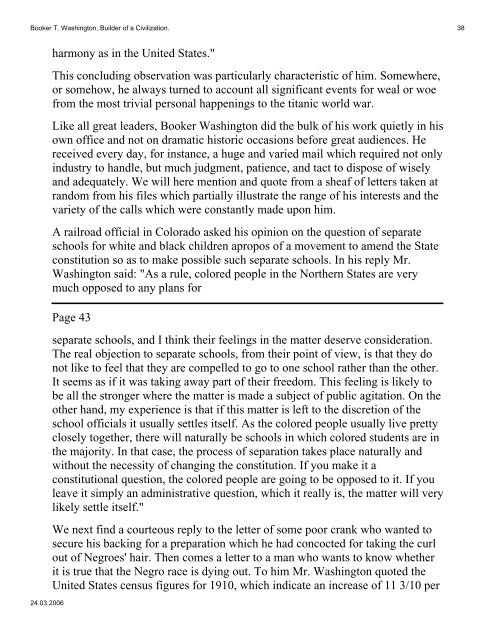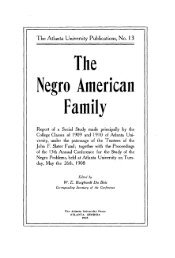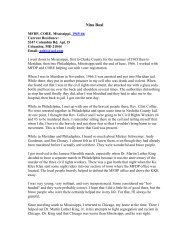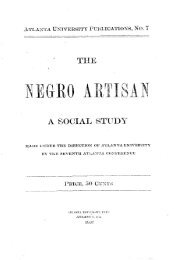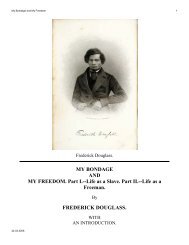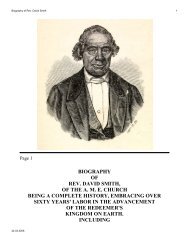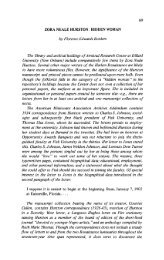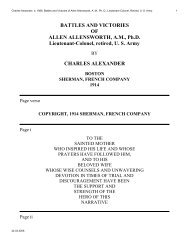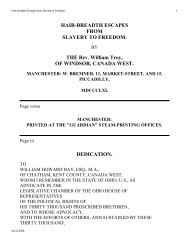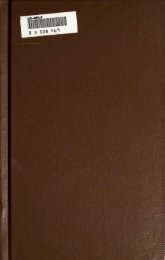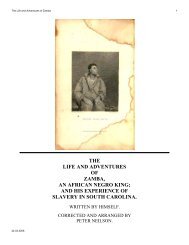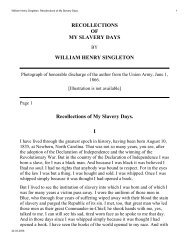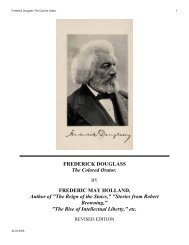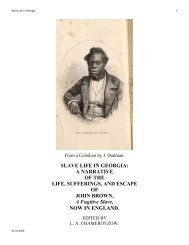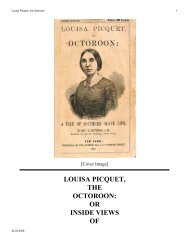Booker T. Washington, Builder o - African American History
Booker T. Washington, Builder o - African American History
Booker T. Washington, Builder o - African American History
You also want an ePaper? Increase the reach of your titles
YUMPU automatically turns print PDFs into web optimized ePapers that Google loves.
<strong>Booker</strong> T. <strong>Washington</strong>, <strong>Builder</strong> of a Civilization. 38<br />
24.03.2006<br />
harmony as in the United States."<br />
This concluding observation was particularly characteristic of him. Somewhere,<br />
or somehow, he always turned to account all significant events for weal or woe<br />
from the most trivial personal happenings to the titanic world war.<br />
Like all great leaders, <strong>Booker</strong> <strong>Washington</strong> did the bulk of his work quietly in his<br />
own office and not on dramatic historic occasions before great audiences. He<br />
received every day, for instance, a huge and varied mail which required not only<br />
industry to handle, but much judgment, patience, and tact to dispose of wisely<br />
and adequately. We will here mention and quote from a sheaf of letters taken at<br />
random from his files which partially illustrate the range of his interests and the<br />
variety of the calls which were constantly made upon him.<br />
A railroad official in Colorado asked his opinion on the question of separate<br />
schools for white and black children apropos of a movement to amend the State<br />
constitution so as to make possible such separate schools. In his reply Mr.<br />
<strong>Washington</strong> said: "As a rule, colored people in the Northern States are very<br />
much opposed to any plans for<br />
Page 43<br />
separate schools, and I think their feelings in the matter deserve consideration.<br />
The real objection to separate schools, from their point of view, is that they do<br />
not like to feel that they are compelled to go to one school rather than the other.<br />
It seems as if it was taking away part of their freedom. This feeling is likely to<br />
be all the stronger where the matter is made a subject of public agitation. On the<br />
other hand, my experience is that if this matter is left to the discretion of the<br />
school officials it usually settles itself. As the colored people usually live pretty<br />
closely together, there will naturally be schools in which colored students are in<br />
the majority. In that case, the process of separation takes place naturally and<br />
without the necessity of changing the constitution. If you make it a<br />
constitutional question, the colored people are going to be opposed to it. If you<br />
leave it simply an administrative question, which it really is, the matter will very<br />
likely settle itself."<br />
We next find a courteous reply to the letter of some poor crank who wanted to<br />
secure his backing for a preparation which he had concocted for taking the curl<br />
out of Negroes' hair. Then comes a letter to a man who wants to know whether<br />
it is true that the Negro race is dying out. To him Mr. <strong>Washington</strong> quoted the<br />
United States census figures for 1910, which indicate an increase of 11 3/10 per


